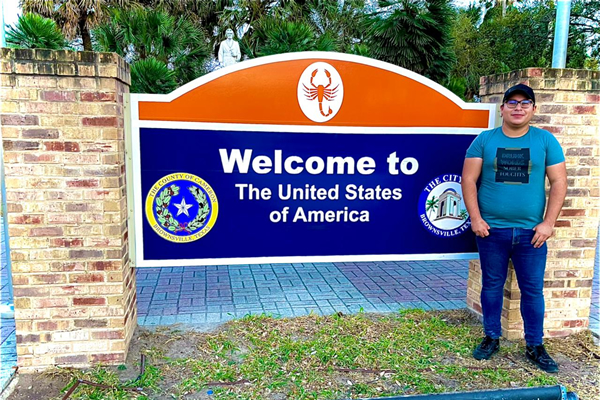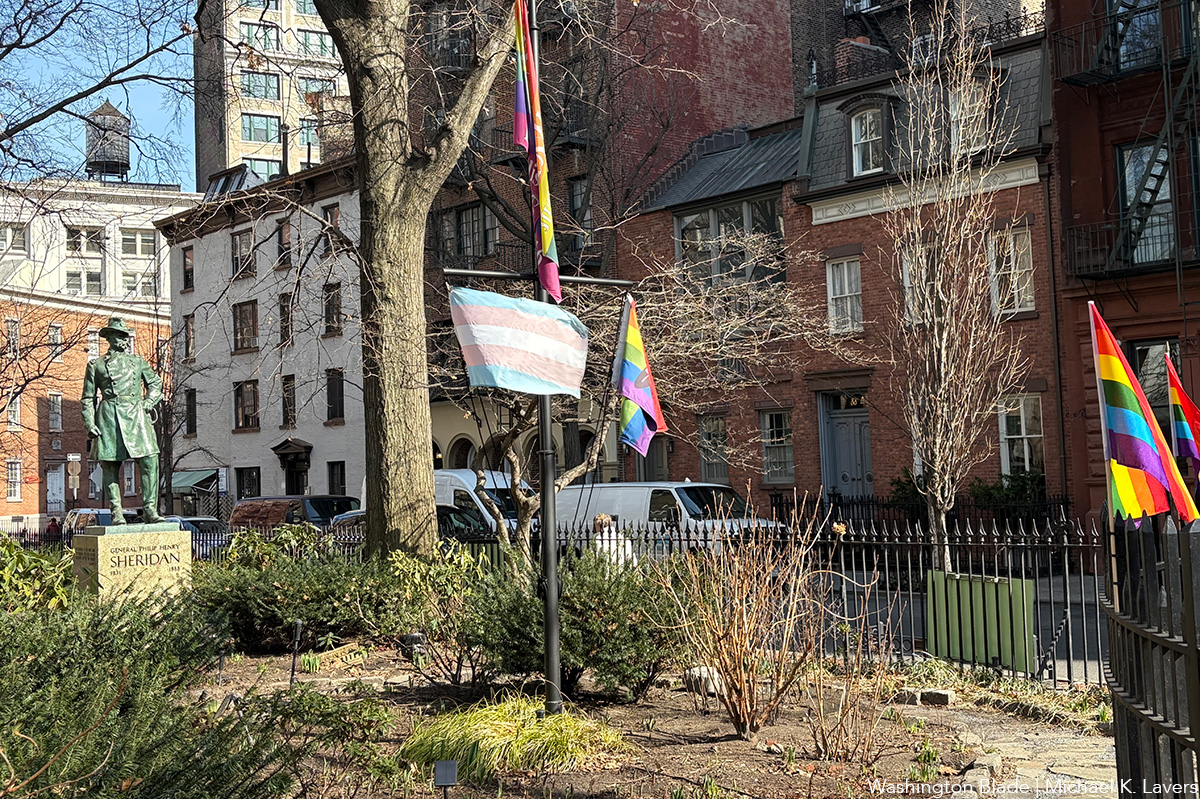National
Biden administration ends ‘Remain in Mexico’ policy
Trump-era program made LGBTQ asylum seekers even more vulnerable

The Biden administration has officially ended a policy that forced asylum seekers to pursue their cases in Mexico.
The previous White House’s Migrant Protection Protocols program, which became known as the “Remain in Mexico” policy, took effect in 2019. Advocates sharply criticized MPP, in part, because it made LGBTQ asylum seekers who were forced to live in Tijuana, Ciudad Juárez, Matamoros and other Mexican border cities even more vulnerable to violence and persecution based on their gender identity and sexual orientation.
The White House in January suspended enrollment in MPP shortly after President Biden took office.
Homeland Security Secretary Alejandro Mayorkas on Tuesday in a memo he sent to acting U.S. Customs and Border Protection Commissioner Troy Miller, acting U.S. Immigration and Customs Enforcement Director Tae Johnson and acting U.S. Citizenship and Immigration Services Director Tracy Renaud that announced the end of the Trump-era policy said roughly 11,200 asylum seekers with MPP cases have been allowed into the U.S. between Feb. 19 and May 25. Estuardo Cifuentes, a gay man from Guatemala who ran Rainbow Bridge Asylum Seekers, a program for LGBTQ asylum seekers and migrants in Matamoros that the Resource Center Matamoros, a group that provides assistance to asylum seekers and migrants in the Mexican border city, helped create, is among them.
“MPP does not adequately or sustainably enhance border management in such a way as to justify the program’s extensive operational burdens and other shortfalls,” wrote Mayorkas in his memo.
“In deciding whether to maintain, modify, or terminate MPP, I have reflected on my own deeply held belief, which is shared throughout this administration, that the United States is both a nation of laws and a nation of immigrants, committed to increasing access to justice and offering protection to people fleeing persecution and torture through an asylum system that reaches decisions in a fair and timely manner,” he added. “To that end, the department is currently considering ways to implement long-needed reforms to our asylum system that are designed to shorten the amount of time it takes for migrants, including those seeking asylum, to have their cases adjudicated, while still ensuring adequate procedural safeguards and increasing access to counsel.”
Steve Roth, executive director of the Organization of Refuge, Asylum and Migration, a Minnesota-based organization that works with LGBTQ refugees and migrants around the world, welcomed the end of MPP.
“We’re very happy to see, at long last, the termination of the dangerous and illegal ‘Remain in Mexico’ policy that was put in place by the Trump administration in early 2019,” Roth told the Washington Blade in a statement. “This policy forced asylum seekers at our Southern border — including many LGBTIQ individuals — to spend months and sometimes years in dangerous Mexican border towns while they waited for their asylum cases to be processed.”
Roth added MPP “was not in keeping with the United States’ commitments to international asylum law and it was not reflective of who we are as a country.”
“We’re grateful to President Biden and his administration for overturning this policy and for their commitment to a just and humane immigration and asylum system,” he said.
Immigration Equality Legal Director Bridget Crawford echoed Roth.
“President Trump created a humanitarian disaster with this policy that has resulted in well over a thousand asylum seekers being assaulted, raped, kidnapped or murdered while awaiting their asylum hearing, including LGBTQ and HIV-positive people,” Crawford told the Blade in a statement.
Ending MPP is the latest in a series of steps the Biden administration has taken to reverse the previous White House’s hardline immigration policies.
State Department spokesperson Ned Price told the Blade last month that protecting migrants and asylum seekers who are fleeing persecution based on their gender identity and sexual orientation is one of the administration’s global LGBTQ rights priorities.
Vice President Kamala Harris is among the administration officials who have publicly acknowledged that anti-LGBTQ violence is a “root cause” of migration from Central America. Texas Congresswoman Veronica Escobar, whose district includes the border city of El Paso, and others have noted to the Blade that Title 42, a Centers for Disease Control and Prevention rule that closed the Southern border to most asylum seekers and migrants because of the coronavirus pandemic, remains in place.
Congress has yet to consider a comprehensive immigration reform bill that Democrats introduced in February. Crawford in her statement also notes Mayorkas’ memo “does not address the many thousands of individuals who were wrongfully denied relief under the MPP program.”
“These people no longer have ‘active’ cases, so they are not being processed by the administration, but many are living in Mexico or have been returned back to their countries where they face persecution. Quite literally, some of these people have been handed a death sentence,” said Crawford. “The Biden administration has not addressed these cases yet and whether people wrongfully denied relief under the MPP program will have an opportunity to renew their claims.”

The White House
A full year of Trump and LGBTQ rights: all that’s been lost
White House since Inauguration Day has relentlessly attacked LGBTQ community

Uncloseted Media published this story on Jan. 20.
By NICO DiALESSANDRO | One year ago today, Donald Trump was inaugurated as president of the United States for the second time. Since then, he and his administration have waged an all-out attack on the LGBTQ community by slashing crucial health and support programs, pressuring states to exclude transgender people from most aspects of life and erasing information about the community’s history. Here are all the biggest moves Trump has made against LGBTQ rights over the last 365 days.
Jan. 20, 2025 – Trump’s second first day
During his inaugural address, Trump says, “As of today, it will henceforth be the official policy of the United States government that there are only two genders: male and female.” Later that day, Trump signs “Defending Women from Gender Ideology Extremism and Restoring Biological Truth to the Federal Government,” an executive order that defines “sex” in federal law to mean biological sex at conception. It also eliminates federal recognition of trans identities, blocks gender self-identification on federal documents, ceases federal funding for gender-affirming care and restricts trans people’s access to bathrooms, prisons, shelters and other government facilities that match their gender identity.
Trump also signs “Ending Radical and Wasteful Government DEI Programs and Preferencing,” an executive order that orders federal agencies to terminate Diversity, Equity and Inclusion mandates, policies and programs. This order repeals a policy put in place by the Biden administration that created initiatives for the federal government to combat systemic barriers related to hiring on the basis of race, religion, income, gender identity, sexual orientation, and disability.
“We’re the party of common sense, you know, we don’t want to have men playing in women’s sports. We don’t want to have transgender operations for everyone,” Trump says at the Liberty Ball party that evening. Trump would go on to repeat the sentiment countless times throughout the year, including at press conferences with world leaders, in an interview with 60 Minutes and even while deploying the National Guard in Washington.
Jan. 21, 2025 – The flurry of executive orders continues
Trump signs “Ending Illegal Discrimination and Restoring Merit-Based Opportunity,” another executive order that revokes a 1965 order which mandated affirmative action for federal contractors and required that they take steps to comply with nondiscrimination laws. The order violates the U.S. Supreme Court’s 2020 decision in Bostock v. Clayton County, which extended Title VII sex-based protections to trans people.
Nearly all LGBTQ- and HIV-focused content and resources are deleted from the White House’s website including the White House’s equity report, information about LGBTQ Pride Month and a fact sheet on expanding access to HIV prevention and treatment. In addition, the State Department removes its LGBTQ rights page, and the Department of Labor removes its LGBTQ workers page.
Jan. 28, 2025 – funding cuts
Trump signs “Protecting Children from Chemical and Surgical Mutilation,” an executive order that bars federal funding for gender-affirming care for minors and directs the Department of Health and Human Services to restrict insurance coverage for such treatments under Medicare, Medicaid and the Affordable Care Act. Hours after Trump signs the order, Uncloseted Media speaks with six LGBTQ kids to get their thoughts.
“For me, it’s definitely very frightening. Especially because right now I’m 16, and so, I’m going to become an adult over the course of his presidency. … And it’s really difficult, especially to plan for the future and have that lack of surety that I thought that I would,” Crow, who lives in Virginia, told Uncloseted Media.
Feb. 3, 2025
Mentions of LGBTQ people are erased or minimized across federal government websites, with a particular focus on trans and intersex people. The State Department first removes trans people in its travel safety guidelines, only mentioning the “LGB” community. As of publication, the web page has no mention of bisexual travelers either.
Feb. 5, 2025
Trump signs “Keeping Men Out of Women’s Sports,” an executive order that prohibits trans women and girls from competing on collegiate female sports teams.
Feb. 13, 2025
Under the direction of Trump’s executive order, the National Park Service removes references to trans and queer rights and history, including from the Stonewall National Monument pages. The “TQ” from “LGBTQ” is dropped in instances where the acronym is present. Protesters gather at the Stonewall National Monument in New York the next day to voice their outrage.
In an interview with Uncloseted Media, Stacy Lentz, co-owner of the Stonewall Inn, calls the removal a blatant attempt to rewrite history and exclude the very people who led the fight for equality.

Feb. 14, 2025
The U.S. withdraws from the United Nations LGBTI Core Group, which formed in 2008 and pledges to support LGBTQ and intersex rights by “work[ing] within the United Nations framework on ensuring universal respect for the human rights and fundamental freedoms for all, specifically lesbian, gay bisexual, transgender and intersex (LGBTI) persons, with a particular focus on protection from violence and discrimination.”
March 15, 2025 – illegal deportations
The Trump-Vance administration deports 238 Venezuelan migrants to CECOT, a maximum-security prison in El Salvador. The administration claims these individuals are affiliated with the Tren de Aragua gang. Andry Hernández Romero, a gay makeup artist seeking asylum, is one of the migrants with no criminal record. Hernández vanished from U.S. custody before his asylum hearing, and his lawyer asserts he was deported without due process.

On July 18, Hernández is returned to Venezuela along with 249 other migrants. The Department of Homeland Security dismisses abuse allegations of torture, sexual assault and other inhumane treatment.
April 2, 2025
U.S. Citizenship and Immigration Services updates its policy to recognize only two biological sexes, male and female, for immigration benefit requests and official documentation. This policy shift reverses previous efforts to accommodate nonbinary and trans individuals, as it removes the “X” gender marker option from immigration forms.
“By denying trans people the right to self-select their gender, the government is making it harder for them to exist safely and with dignity. This is not about ‘common sense’ — it is about erasing an entire community from the legal landscape,” says Bridget Crawford, director of law and policy at Immigration Equality.
April 3, 2025
In his first few months in office, Trump and his administration cancel over 270 National Institutes of Health grants focused on LGBTQ health, totaling at least $125 million in unspent funds. The cancellations disrupt research on HIV testing and prevention, AIDS, cancer, mental health and more.
The cuts scrap more than $800 million worth of research into the health of LGBTQ people. The cuts abandon studies of cancers and viruses and set back efforts to defeat a resurgence of sexually transmitted infections. They also eliminate swaths of medical research on diseases that disproportionately afflict LGBTQ people, including HIV/AIDs, various sexually transmitted infections and cancers.
June 2, 2025
Stanford begins suspending gender-affirming care for people younger than 19 in response to Trump’s executive order. Other major health networks and many regional centers across the country begin following suit.
Children’s Hospital Los Angeles announces they will be cutting off care for patients as old as 25 beginning in July, stating that they were left with “no viable alternative” because they could not risk any cuts to their federal funding.
June 6, 2025
Trump’s military ban begins, disallowing trans people from serving in all branches of the armed forces and removing those currently in the service. Those who do not identify themselves will have their medical records surveyed and be involuntarily separated if it is discovered that they are trans.
July 1, 2025
Trump’s “Big Beautiful Bill” is passed by Congress. The sweeping package of tax breaks that largely benefit the wealthy include major funding cuts to LGBTQ health care as well as a number of support programs that disproportionately serve queer people.
July 17, 2025
The Trump-Vance administration officially shuts down the LGBTQ-specific option on the 988 youth suicide hotline. This comes a year after data finds that 41 percent of LGBTQ youth seriously considered suicide. Notably, there are no plans to shut down the other targeted hotline options. Arden, who called when they were 16, told Uncloseted Media, “If it weren’t for the hotline, I would have killed myself.”
Aug. 4, 2025
U.S. Immigration and Customs Enforcement arrests 40-year-old asylum seeker Rickardo Anthony Kelly during a routine immigration appointment. Kelly, who survived being shot 10 times in Jamaica by attackers who targeted him for being gay, is released two weeks later and describes the conditions of the ICE facility as “unconscionable,” “inhumane,” and “horrific.”
Aug. 12, 2025
The State Department releases a revised 2024 human rights report that omits references to LGBTQ people and erases mentions of discrimination based on sexual orientation or gender identity. The report also removes critiques of governments for mistreating LGBTQ communities.
It excludes information about Hungary’s anti-LGBTQ laws that encourage citizens to report their LGBTQ neighbors and that ban depictions of homosexuality or gender transition in schools or the media.
Aug. 15, 2025
The Trump-Vance administration announces plans to eliminate gender-affirming care from the Federal Employees Health Benefits Program starting in 2026. The policy would also block access to hormones and surgeries for federal workers and their families.
Aug. 20, 2025
The media reports on court filings that reveal that the Justice Department issued subpoenas to hospitals for private medical records of LGBTQ patients 18 and younger. The DOJ requests billing data, communication with drug manufacturers, Social Security numbers and recordings from providers who treat gender nonconforming minors. Doctors across the country report threats and fear government retaliation.
“The subpoena is a breathtakingly invasive government overreach. … It’s specifically and strategically designed to intimidate health care providers and health care institutions into abandoning their patients,” says Jennifer L. Levi, senior director of transgender and queer rights at GLAD law, an LGBTQ legal group and civil rights organization.
Sept. 4, 2025
In response to a mass shooting in Minneapolis that was carried out by a trans woman, CNN reports that the DOJ is considering restricting trans Americans’ Second Amendment rights. The department aims to justify a firearm ban by declaring trans people mentally “defective,” building off of Trump’s trans military ban. The proposal sparks backlash from the National Rifle Association, who says in a statement that they will not “support … gun bans that arbitrarily strip law-abiding citizens of their Second Amendment rights.”
Sept. 12, 2025
The DOJ removes a study from its website showing that far-right extremists have killed more Americans than any other domestic terrorist group. The archived report disappears two days after anti-LGBTQ conservative activist Charlie Kirk is assassinated.

Sept. 22, 2025
White House Press Secretary Karoline Leavitt claims the administration is investigating why trans people are turning to “domestic terrorism,” despite no evidence of this. She calls anyone denying the false link “willfully ignorant,” despite the most recent data available from 2018 showing that trans people are four times more likely to be victims of violent crime when compared to cisgender people.
Sept. 23, 2025
Trump cancels a budget meeting and blames a potential government shutdown on Democrats’ support for trans-inclusive policies.
Oct. 1, 2025
FBI Director Kash Patel fires a trainee for displaying a Pride flag on his desk, labeling it an improper “political” message. The dismissal follows reports that pro-Trump appointees are combing internal FBI files to identify LGBTQ employees.
Oct. 3, 2025
Education Secretary Linda McMahon sends a nine-page proposal to nine universities that asks for a commitment to ban trans-inclusive facilities, define sex by “reproductive function” and limit race, gender or identity factors in admissions. The proposal calls for schools to revise their governance structures by “abolishing institutional units that purposefully punish, belittle, and even spark violence against conservative ideas.”
Oct. 10, 2025
The White House lays off more than 1,100 HHS employees. The Office of Population Affairs, which administered Title X family-planning networks, teen pregnancy prevention and LGBTQ health initiatives, is eliminated.
Nov. 6, 2025
The Supreme Court grants the Trump-Vance administration’s request to put a hold on federal rulings in Massachusetts, affecting trans and nonbinary people by preventing them from self-identifying correctly on their IDs, claiming to be in line with Trump’s “Defending Women from Gender Ideology Extremism and Restoring Biological Truth to the Federal Government” executive order. In her dissent, Justice Ketanji Brown Jackson writes, “This court has once again paved the way for the immediate infliction of injury without adequate (or, really, any) justification. Because I cannot acquiesce to this pointless but painful perversion of our equitable discretion, I respectfully dissent.”
Dec. 4, 2025
According to a memo obtained by NPR, the DOJ instructs inspectors to stop evaluating prisons and jails using standards designed to protect trans, intersex, and gender nonconforming people from sexual violence. This is in direct violation of the Prison Rape Elimination Act.
Dec. 18, 2025
HHS Secretary Robert F. Kennedy Jr. and Mehmet Oz, who leads Medicaid and Medicare, announce that HHS is heavily restricting trans health care; prohibiting Medicaid reimbursement for gender-affirming care for people under 18; and blocking all Medicare and Medicaid funding for hospitals that provide the care to minors.
Jan. 1, 2026
The Office of Personnel Management institutes policy changes that exclude coverage for “chemical and surgical” gender-affirming care in the FEHB and Postal Service Health Benefits plans for 2026, with narrow exceptions.
Jan. 7, 2026
Renee Good is shot and killed by ICE agent Jonathan Ross in Minneapolis. Good leaves behind a wife, Becca, and three children. In a statement, Becca remembers her wife:
“Renee lived by an overarching belief: there is kindness in the world and we need to do everything we can to find it where it resides and nurture it where it needs to grow. Renee was a Christian who knew that all religions teach the same essential truth: we are here to love each other, care for each other, and keep each other safe and whole.”

Days later, Trump tells reporters, “At a very minimum, that woman was very, very disrespectful to law enforcement. … It was highly disrespectful of law enforcement. The woman and her friend were highly disrespectful of law enforcement.”
Additional reporting by Hope Pisoni. Washington Blade photos by Michael Key and Michael K. Lavers.
Florida
DNC slams White House for slashing Fla. AIDS funding
State will have to cut medications for more than 16,000 people

The Trump-Vance administration and congressional Republicans’ “Big Beautiful Bill” could strip more than 10,000 Floridians of life-saving HIV medication.
The Florida Department of Health announced there would be large cuts to the AIDS Drug Assistance Program in the Sunshine State. The program switched from covering those making up to 400 percent of the Federal Poverty Level, which was anyone making $62,600 or less, in 2025, to only covering those making up to 130 percent of the FPL, or $20,345 a year in 2026.
Cuts to the AIDS Drug Assistance Program, which provides medication to low-income people living with HIV/AIDS, will prevent a dramatic $120 million funding shortfall as a result of the Big Beautiful Bill according to the Florida Department of Health.
The International Association of Providers of AIDS Care and Florida Surgeon General Joseph Ladapo warned that the situation could easily become a “crisis” without changing the current funding setup.
“It is a serious issue,” Ladapo told the Tampa Bay Times. “It’s a really, really serious issue.”
The Florida Department of Health currently has a “UPDATES TO ADAP” warning on the state’s AIDS Drug Assistance Program webpage, recommending Floridians who once relied on tax credits and subsidies to pay for their costly HIV/AIDS medication to find other avenues to get the crucial medications — including through linking addresses of Florida Association of Community Health Centers and listing Florida Non-Profit HIV/AIDS Organizations rather than have the government pay for it.
HIV disproportionately impacts low income people, people of color, and LGBTQ people
The Tampa Bay Times first published this story on Thursday, which began gaining attention in the Sunshine State, eventually leading the Democratic Party to, once again, condemn the Big Beautiful Bill pushed by congressional republicans.
“Cruelty is a feature and not a bug of the Trump administration. In the latest attack on the LGBTQ+ community, Donald Trump and Florida Republicans are ripping away life-saving HIV medication from over 10,000 Floridians because they refuse to extend enhanced ACA tax credits,” Democratic National Committee spokesperson Albert Fujii told the Washington Blade. “While Donald Trump and his allies continue to make clear that they don’t give a damn about millions of Americans and our community, Democrats will keep fighting to protect health care for LGBTQ+ Americans across the country.”
More than 4.7 million people in Florida receive health insurance through the federal marketplace, according to KKF, an independent source for health policy research and polling. That is the largest amount of people in any state to be receiving federal health care — despite it only being the third most populous state.
Florida also has one of the largest shares of people who use the AIDS Drug Assistance Program who are on the federal marketplace: about 31 percent as of 2023, according to the Tampa Bay Times.
“I can’t understand why there’s been no transparency,” David Poole also told the Times, who oversaw Florida’s AIDS program from 1993 to 2005. “There is something seriously wrong.”
The National Alliance of State and Territorial AIDS Directors estimates that more than 16,000 people will lose coverage
U.S. Supreme Court
Competing rallies draw hundreds to Supreme Court
Activists, politicians gather during oral arguments over trans youth participation in sports

Hundreds of supporters and opponents of trans rights gathered outside of the United States Supreme Court during oral arguments for Little v. Hecox and West Virginia v. B.P.J. on Tuesday. Two competing rallies were held next to each other, with politicians and opposing movement leaders at each.
“Trans rights are human rights!” proclaimed U.S. Sen. Ed Markey (D-Mass.) to the crowd of LGBTQ rights supporters. “I am here today because trans kids deserve more than to be debated on cable news. They deserve joy. They deserve support. They deserve to grow up knowing that their country has their back.”

“And I am here today because we have been down this hateful road before,” Markey continued. “We have seen time and time again what happens when the courts are asked to uphold discrimination. History eventually corrects those mistakes, but only after the real harm is done to human beings.”
View on Threads
U.S. Education Secretary Linda McMahon spoke at the other podium set up a few feet away surrounded by signs, “Two Sexes. One Truth.” and “Reality Matters. Biology Matters.”
“In just four years, the Biden administration reversed decades of progress,” said McMahon. “twisting the law to urge that sex is not defined by objective biological reality, but by subjective notion of gender identity. We’ve seen the consequences of the Biden administration’s advocacy of transgender agendas.”

U.S. Rep. Mark Takano (D-Calif.), chair of the Congressional Equality Caucus, was introduced on the opposing podium during McMahon’s remarks.
“This court, whose building that we stand before this morning, did something quite remarkable six years ago.” Takano said. “It did the humanely decent thing, and legally correct thing. In the Bostock decision, the Supreme Court said that trans employees exist. It said that trans employees matter. It said that Title VII of the Civil Rights Act protects employees from discrimination based on sex, and that discrimination based on sex includes discrimination based on gender identity and sexual orientation. It recognizes that trans people have workplace rights and that their livelihoods cannot be denied to them, because of who they are as trans people.”
“Today, we ask this court to be consistent,” Takano continued. “If trans employees exist, surely trans teenagers exist. If trans teenagers exist, surely trans children exist. If trans employees have a right not to be discriminated against in the workplace, trans kids have a right to a free and equal education in school.”
Takano then turned and pointed his finger toward McMahon.
“Did you hear that, Secretary McMahon?” Takano addressed McMahon. “Trans kids have a right to a free and equal education! Restore the Office of Civil Rights! Did you hear me Secretary McMahon? You will not speak louder or speak over me or over these people.”
Both politicians continued their remarks from opposing podiums.
“I end with a message to trans youth who need to know that there are adults who reject the political weaponization of hate and bigotry,” Takano said. “To you, I say: you matter. You are not alone. Discrimination has no place in our schools. It has no place in our laws, and it has no place in America.”


















